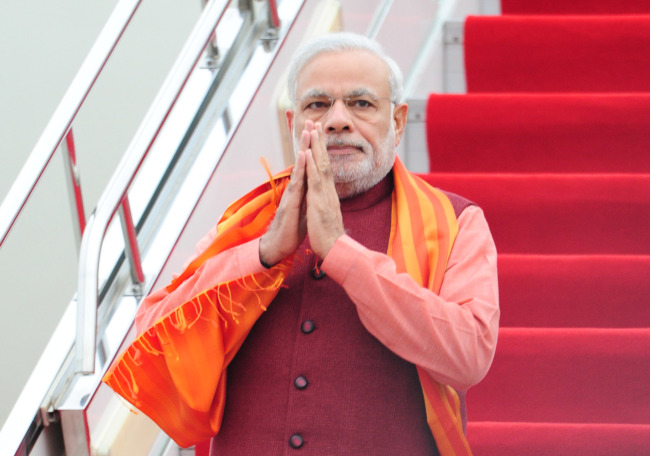BEIJING ― They are the strongest leaders to emerge in years from the world’s two most populous nations ― and appear to be trying to forge a strong working relationship.
In a rare personal touch, Chinese President Xi Jinping will host the Indian prime minister in his hometown of Xi’an for Thursday’s start of Narendra’s Modi’s three-day visit, highlighting warming ties between the Asian giants despite their continued rivalry and contrasting political systems.
The move returns the favor after Modi hosted Xi in his own hometown of Ahmadebad last year. The two men will aim to move beyond the symbolism and take substantial steps to seal a new spirit of cooperation.
China is looking to India as a market for its increasingly high-tech goods, from high-speed trains to nuclear power plants, while India is keen to attract Chinese investment in manufacturing and infrastructure. With a slowing economy, excess production capacity and nearly $4 trillion in foreign currency reserves, China is ready to satisfy India’s estimated $1 trillion in demand for infrastructure projects such as airports, roads, ports and railways.

Indian Prime Minister Narendra Modi arrives in Xian, capital of northwest China’s Shaanxi province, Thursday. (Xinhua-Yonhap)
“India is looking for investments, and China has the money. It could be a win-win for both countries,’’ said Srikanth Kondapalli, Chinese studies professor at New Delhi’s Jawaharlal Nehru University.
The two countries also have deep, enduring differences over their disputed border and China’s expanding naval presence in the Indian Ocean. With a combined population of 2.6 billion, the two nations also remain political polar opposites, with India lining up with fellow democracies such as Japan and the U.S. while authoritarian China regards both as its key rivals.
Both Xi and Modi have considerable personal authority to drive the relationship. Since taking the helm of the ruling Communist Party in 2012, Xi has consolidated control over the military, economy and foreign policy to an extent unseen in two decades. Modi’s Bharatiya Janata Party swept national elections a year ago, largely based on his personal charisma.
In China, top priority for Modi will be exploring ways of reducing India’s $48 billion trade deficit with its neighbor amid flagging demand for India’s main export to China, iron ore.
That task could be eased by establishing a close, personal relationship with Xi and other Chinese leaders, helping Modi further his domestic agenda of strengthening the Indian economy through trade ties and Chinese investment, said T.C.A. Rangachari, a former Indian ambassador to Beijing.
“I think the personal relationship does help,’’ said Rangachari. The informal setting in Xi’an provides the conditions under which “greater understanding between the leaders can take place,’’ he said.
The two are expected to build on agreements reached during Xi’s visit to India to begin discussions on civil nuclear energy plus embark on a five-year economic and trade development plan. They also agreed to set up two Chinese industrial parks in India, while China promised to invest $20 billion in Indian infrastructure over the next five years.
They are also expected to discuss efforts to end a long-festering border dispute that sparked a bloody month-long conflict in 1962.
China claims about 90,000 square kilometers in India’s northeastern state of Arunachal Pradesh, referred to informally by some Chinese as “Southern Tibet.’’ India says China is occupying 38,000 square kilometers of territory on the Aksai Chin plateau.
While relatively low-key in recent years, the dispute flared as recently as February when China protested a visit by Modi to Arunachal Pradesh.
Rather than resolve the dispute outright, the sides will likely focus on ways to handle incidents “through a proper mechanism’’ once they occur, said Zhao Gancheng, Director of the Asia Pacific Center at Shanghai Institute for International Studies.
More worrying for India have been growing forays by Chinese naval vessels, including submarines, into what New Delhi considers its strategic backyard. China’s navy is active in the Gulf of Aden as part of anti-piracy patrols, and Beijing has invested heavily in port facilities in Sri Lanka and Pakistan.
India, meanwhile, has inserted itself into the knotty controversy in the South China Sea, where China’s sovereignty claims are challenged by others in the region. Beijing expressed deep displeasure after Modi and Obama issued a joint statement last year during the Indian president’s visit to Washington expressing concern over the maritime disputes and affirming theeuroneed to safeguard security and the freedom of navigation and overflight.
Another divisive issue is China’s deep ties with Pakistan, India’s archrival, where Xi received a lavish reception last month. That, along with a Chinese commitment to invest up to $46 billion in the country, seemed to affirm that Beijing won’t be downgrading what it calls its “all-weather friendship’’ with Islamabad in favor of New Delhi.
The presence of Tibetan exiled leader the Dalai Lama in India also rankles Beijing, although New Delhi has scrupulously avoided using him as a diplomatic foil. China reviles the Buddhist cleric, who fled to India in 1959, as a separatist.
In Xi’an, the two leaders are expected to visit the excavation site of the famed terra cotta soldier statues as well as the Wild Goose Pagoda, a renowned Buddhist site.
On Friday in Beijing, the two will hold formal talks before Modi moves on to Shanghai on Saturday, where he will address what is being billed as the largest-ever gathering of Indians in China and meet with business leaders such as Alibaba’s Jack Ma, who has invested in Indian technology start-ups.
Modi already has strong personal ties to China, having visited twice while chief minister of Gujarat, and recently took to China’s twitter-like Weibo microblogging service, where he received both welcomes from Chinese users and snarky references to the border dispute.
(AP)




![[Weekender] How DDP emerged as an icon of Seoul](http://res.heraldm.com/phpwas/restmb_idxmake.php?idx=645&simg=/content/image/2024/04/25/20240425050915_0.jpg&u=)

